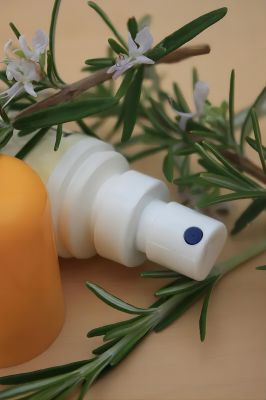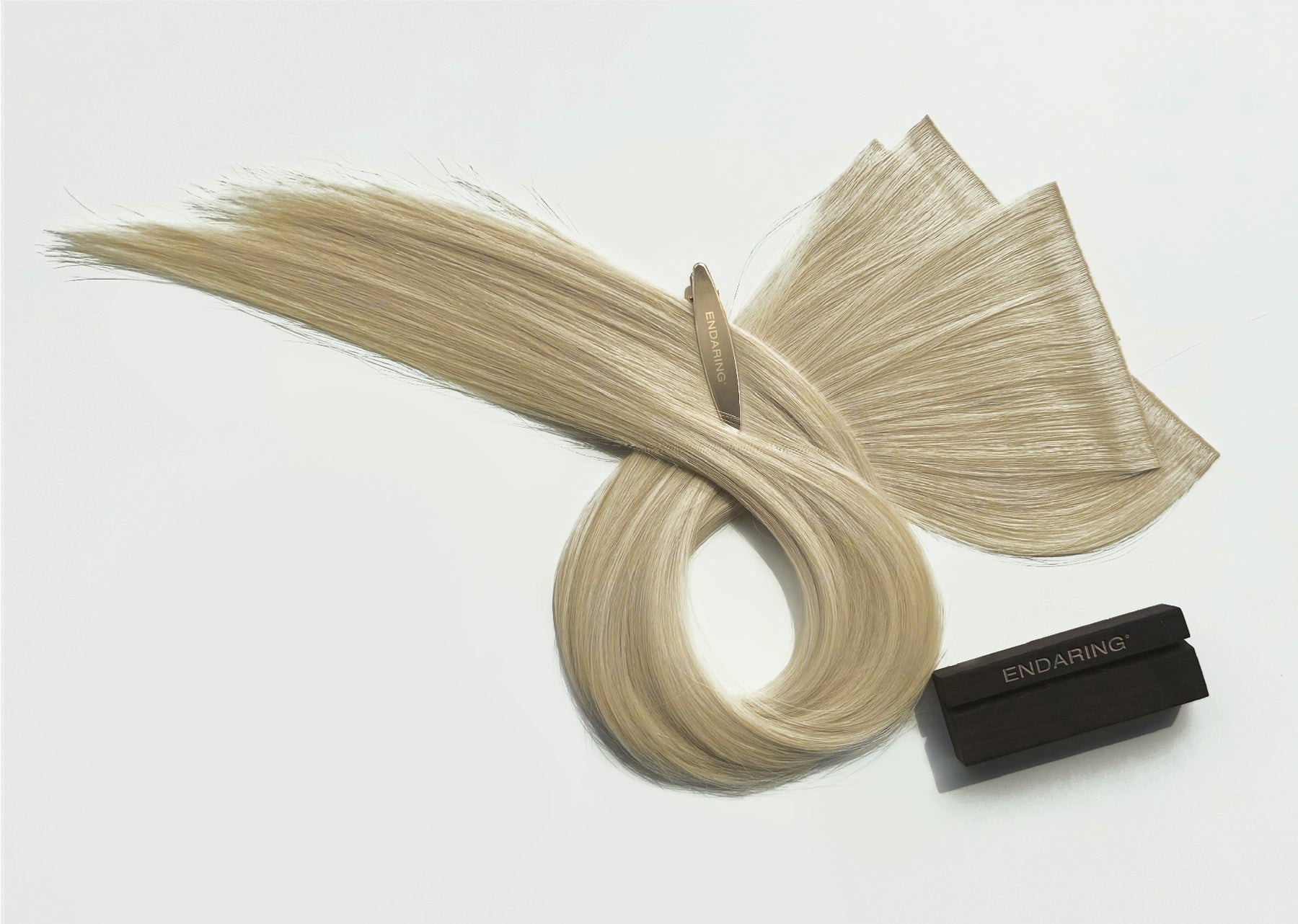Today, we're delving into the enchanting world of rosemary water – a secret elixir that's been cherished for centuries as a hair care miracle.
In this step-by-step tutorial, we're going to unveil how to make rosemary water for hair. But that's not all; we're diving deeper into the rosemary revolution with essential subtopics that will guide you through every aspect of this aromatic journey.

- The Benefits of Rosemary Water for Hair Health:
Rosemary, a fragrant herb that's often the star of your culinary adventures, holds a treasure trove of benefits for your hair that extend far beyond the kitchen. Delve into the world of hair care with rosemary water and uncover its astounding natural properties:
Stimulating Hair Follicles: The active compounds found in rosemary, such as ursolic acid and rosmarinic acid, have been shown to stimulate hair follicles' activity. This means that regular use of rosemary water can potentially promote hair growth by encouraging dormant follicles to sprout new strands.

Promoting Healthy Hair Growth: Rosemary is rich in antioxidants that help protect hair follicles from damage caused by free radicals. When your hair follicles are healthy, they're more likely to produce strong, vibrant strands, leading to an overall improvement in hair health and appearance.
Enhancing Circulation: Massaging your scalp with rosemary water can enhance blood circulation to the hair follicles. Improved blood flow means that hair follicles receive more oxygen and nutrients, creating a conducive environment for optimal hair growth.
Anti-Dandruff Properties: Say goodbye to those pesky white flakes! Rosemary's antimicrobial properties can help combat dandruff by preventing the overgrowth of yeast on the scalp. This reduction in yeast levels can significantly reduce flakiness and itchiness.
Calming an Itchy Scalp: An itchy scalp can be incredibly bothersome. The soothing and anti-inflammatory properties of rosemary can provide relief from itchiness, redness, and irritation. Incorporating rosemary water into your routine can contribute to a more comfortable scalp.
Aromatic Relaxation: Beyond its tangible benefits, the invigorating scent of rosemary can provide a sense of relaxation and well-being during your hair care routine. The aromatherapeutic effects of rosemary can help reduce stress levels, making your hair care ritual a moment of self-care.
- Choosing the Right Rosemary and Water for Your DIY Recipe:
In the realm of crafting your own rosemary water, the journey begins with the selection of the right ingredients – a crucial factor that lays the foundation for the potency and effectiveness of your end product. Here's a detailed breakdown of how to make the perfect choice:
Fresh and Organic Rosemary Sprigs: Just as you'd choose the finest ingredients for a gourmet dish, opt for fresh and organic rosemary sprigs. Seek out vibrant, green sprigs with intact leaves and a strong aroma. The essential oils responsible for rosemary's hair-loving benefits are at their peak in fresh sprigs, ensuring your rosemary water infusion delivers the maximum possible impact.
Essential Oils Content: When selecting rosemary sprigs, give them a gentle rub between your fingers. If you're met with an invigorating burst of fragrance, it's a sign that the essential oils are abundant and ready to infuse into your water. This aromatic indicator assures you of the sprigs' potency.
Distilled or Purified Water: Just as rosemary quality matters, so does the water you use as the base for your infusion. Opt for distilled or purified water to ensure the absence of impurities or contaminants that could hinder your rosemary water's effectiveness. Using clean, high-quality water guarantees that your infusion remains pure and free from any unwanted elements.

Avoid Tap Water: It's advisable to steer clear of tap water due to the presence of minerals and chemicals that might interfere with the infusion process. Tap water can contain chlorine, which might negatively interact with the natural compounds in rosemary, reducing its benefits.
Balancing the Proportions: The ratio of rosemary to water plays a role in determining the concentration of your final infusion. As a general guideline, aim for about 1 cup of fresh rosemary leaves per 2 cups of water. This proportion strikes a balance between potency and dilution, allowing the essential oils to infuse into the water effectively.
- Step-by-Step Guide: Making Your Own Rosemary Water at Home:
Embark on a journey of hands-on creation as we walk you through the process of crafting your very own rosemary water. This delightful venture involves several carefully orchestrated steps to ensure the optimal extraction of rosemary's goodness:
Preparation: Begin by gathering fresh rosemary sprigs, ideally harvested from your garden or sourced from a trusted supplier. Thoroughly inspect the sprigs, and gently remove any dirt, debris, or insects that might be clinging to the leaves or stems.
Bruising the Leaves: To unlock the aromatic oils housed within the rosemary leaves, give them a gentle bruising. This can be done by rolling the leaves between your fingers or using a mortar and pestle. The goal is to release the essential oils that hold the herb's potent properties.
Boiling Water: In a heat-resistant container, bring distilled water to a boil. Distilled water ensures that your infusion remains pure, free from contaminants that could compromise its effectiveness.
Infusion: Place the bruised rosemary sprigs in the heat-resistant container. Then, pour the boiling water over the rosemary, ensuring that the sprigs are fully submerged. This step initiates the infusion process, allowing the water to absorb the herbal goodness of the rosemary.
Cover and Steep: Cover the container to trap the aromatic steam and essential oils within. Allow the rosemary to steep in the hot water for a few hours. The steeping duration lets the water absorb the herb's properties, resulting in a potent and effective infusion.
Straining: After the steeping period, it's time to separate the infused water from the rosemary solids. Using a fine mesh strainer or cheesecloth, strain the mixture into another container. This ensures that your rosemary water is free from any solid particles, leaving you with a clear and aromatic infusion.
Bottling: Transfer the strained rosemary water into a clean, dark glass bottle. Dark glass helps protect the infusion from light exposure, maintaining its freshness and potency over time.

- Incorporating Rosemary Water into Your Hair Care Routine:
Once you have your homemade rosemary water ready, it's time to introduce it to your hair care routine. After shampooing and conditioning your hair, use rosemary water as a final rinse. Gently massage it into your scalp and hair, allowing the herbal infusion to distribute evenly. The invigorating scent and tingling sensation indicate that the rosemary water is working its magic. Leave it in – there's no need to rinse it out. Incorporating rosemary water into your routine can provide an extra layer of nourishment and freshness for your locks.
- DIY Rosemary Water Variations: Tailoring the Recipe to Your Hair Type:
Oily Hair: If your scalp tends to get greasy quickly, you can enhance your rosemary water with a splash of witch hazel or aloe vera gel. Witch hazel's astringent properties help control excess sebum production, while aloe vera adds moisture without making your hair feel heavy. This variation ensures that your rosemary water strikes a balance between clarifying and hydrating, ideal for managing oily locks.
Dry Hair: For hair that's thirsting for hydration, consider infusing your rosemary water with a touch of jojoba oil or glycerin. Jojoba oil closely resembles the natural sebum produced by your scalp, making it a fantastic moisturizing agent. Glycerin attracts moisture from the air, ensuring your hair remains well-hydrated. These additions transform your rosemary water into a potent elixir that quenches the thirst of dry strands.
Sensitive Scalp: If your scalp tends to react sensitively to products, you can tailor your rosemary water by diluting it with a bit more purified water. This gentle variation ensures that your rosemary water is soothing and nurturing, providing relief to an easily irritated scalp.
Balancing Proportions: As you incorporate additional ingredients, be mindful of maintaining a balanced proportion. Start with small amounts and gradually adjust based on how your hair responds. The goal is to create a harmonious blend that addresses your specific concerns without overwhelming your infusion.
By personalizing your rosemary water, you're taking DIY hair care to the next level. These variations showcase the adaptability of rosemary water, allowing it to cater to the diverse needs of different hair types. Whether your hair is oily, dry, or somewhere in between, your customized rosemary water formula ensures that you're getting the maximum benefits tailored to your hair's unique characteristics.
So, whether you're a seasoned DIY enthusiast or just beginning to explore the world of homemade hair care, prepare to dive into the captivating world of rosemary water. This aromatic adventure promises to infuse your locks with nature's goodness, revitalizing your hair in ways you've never imagined. Are you ready to create some enchanting rosemary magic? Let's embark on this journey and unveil the beauty that rosemary water can bring to your hair care routine.





